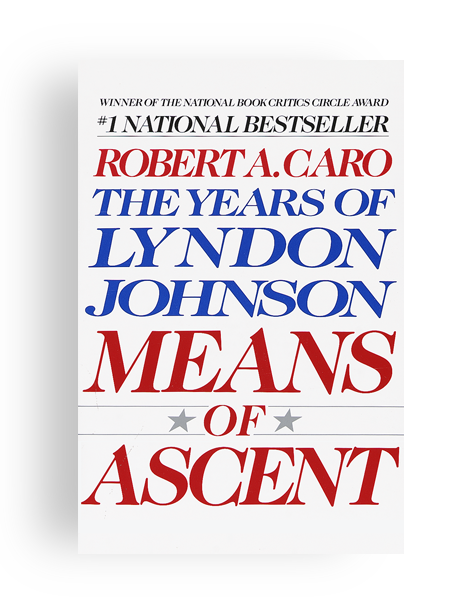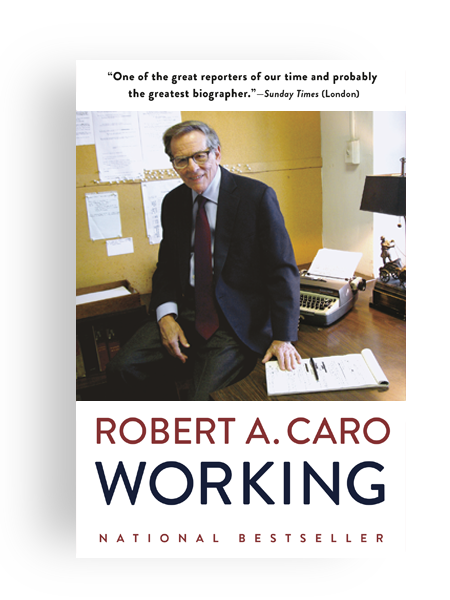WINNER OF THE PULITZER PRIZE
The Power Broker
Robert Caro’s monumental book makes public what few outsiders knew: that Robert Moses was the single most powerful man of his time in the City and in the State of New York. And in telling the Moses story, Caro both opens up to an unprecedented degree the way in which politics really happens—the way things really get done in America’s City Halls and Statehouses—and brings to light a bonanza of vital information about such national figures as Alfred E. Smith and Franklin D. Roosevelt (and the genesis of their blood feud), about Fiorello La Guardia, John V. Lindsay and Nelson Rockefeller.
But The Power Broker is first and foremost a brilliant multidimensional portrait of a man—an extraordinary man who, denied power within the normal framework of the democratic process, stepped outside that framework to grasp power sufficient to shape a great city and to hold sway over the very texture of millions of lives. We see how Moses began: the handsome, intellectual young heir to the world of Our Crowd, an idealist. How, rebuffed by the entrenched political establishment, he fought for the power to accomplish his ideals. How he first created a miraculous flowering of parks and parkways, playlands and beaches—and then ultimately brought down on the city the smog-choked aridity of our urban landscape, the endless miles of (never sufficient) highway, the hopeless sprawl of Long Island, the massive failures of public housing, and countless other barriers to humane living. How, inevitably, the accumulation of power became an end in itself.
Moses built an empire and lived like an emperor. He was held in fear—his dossiers could disgorge the dark secret of anyone who opposed him. He was, he claimed, above politics, above deals; and through decade after decade, the newspapers and the public believed. Meanwhile, he was developing his public authorities into a fourth branch of government known as “Triborough”—a government whose records were closed to the public, whose policies and plans were decided not by voters or elected officials but solely by Moses—an immense economic force directing pressure on labor unions, on banks, on all the city’s political and economic institutions, and on the press, and on the Church. He doled out millions of dollars’ worth of legal fees, insurance commissions, lucrative contracts on the basis of who could best pay him back in the only coin he coveted: power. He dominated the politics and politicians of his time—without ever having been elected to any office. He was, in essence, above our democratic system.
Robert Moses held power in the state for 44 years, through the governorships of Smith, Roosevelt, Lehman, Dewey, Harriman and Rockefeller, and in the city for 34 years, through the mayoralties of La Guardia, O’Dwyer, Impellitteri, Wagner and Lindsay, He personally conceived and carried through public works costing 27 billion dollars—he was undoubtedly America’s greatest builder.
This is how he built and dominated New York—before, finally, he was stripped of his reputation (by the press) and his power (by Nelson Rockefeller). But his work, and his will, had been done.

A modern American classic, this huge and galvanizing biography of Robert Moses reveals not only the saga of one man’s incredible accumulation of power but the story of his shaping (and mis-shaping) of twentieth-century New York.
PURCHASE THE BOOK
Winner of the 1975 Pulitzer Prize in Biography
Winner of the Francis Parkman Prize
Named One of the 100 Greatest Books of the 20th Century by the Modern Library
Praise for The Power Broker
DAVID HALBERSTAM
“Surely the greatest book ever written about a city.”
PRESIDENT BARACK OBAMA
“I think about Robert Caro and reading The Power Broker back when I was twenty-two years old and just being mesmerized, and I’m sure it helped to shape how I think about politics.”
Tom & Mandy Levis
DOMINIC SANDBROOK, THE SUNDAY TIMES
“Simply one of the best nonfiction books in English of the past 40 years…There has probably never been a better dissection of political power…From the first page…you know that you are in the hands of a master…Not just a stunning portrait of perhaps the most influential builder in world history, but an object lesson in the dangers of power. Every politician should read it.”
JUSTIN KAPLAN, PULITZER PRIZE–WINNING BIOGRAPHER
“A triumph, brilliant and totally fascinating. A majestic, even Shakespearean, drama about the interplay of power and personality.”
RICHARD C. WADE, THE NEW YORK TIMES BOOK REVIEW
“In the future, the scholar who writes the history of American cities in the twentieth century will doubtless begin with this extraordinary effort.”
DANIEL BERHER, BALTIMORE EVENING SUN
“One of the most exciting, un-put-downable books I have ever read. This is a study of the corruption which power exerts on those who wield it to set beside Tacitus and his emperors, Shakespeare and his kings.”
THE GUARDIAN
“A modern Machiavelli’s Prince.”
JANE JACOBS
“Apart from the book’s being so good as biography, as city history, as sheer good reading, The Power Broker is an immense public service.”

Photo by Arnold Newman, National Portrait Gallery, Smithsonian Institution
THE WORLD OF ROBERT MOSES
Exploring Power
For Robert Caro, biography has always been a means to an end: understanding the nature of political power, how it is acquired, how it is used, and to what ends. In choosing to tackle a public figure as enormously consequential for New York City as Robert Moses, the young Newsday reporter let it be known that he would not be intimidated by power.

Photo by Arnold Newman
The arc of The Power Broker begins with an idealistic prodigy born to wealth whose animating vision was to improve the lives of ordinary New Yorkers. During his life, he is transformed into a ruthless administrator for whom the vast accumulation of power was an end itself.
While he was working on the book, Caro came to feel that he could not write truly about political power without examining not only those who wielded power but also those on whom it was wielded, either for good or ill. His book—and all the books to come—would be not only about the powerful but the powerless.
In The Power Broker, Caro focused on lives needlessly disrupted, homes destroyed, and neighborhoods pillaged to accommodate the ambitions of the master builder. The book was a huge success, and it won Caro both the Pulitzer Prize and the Francis Parkman Prize.
Below are selections from the Robert A. Caro Archive, Patricia D. Klingenstein Library, New-York Historical Society.
Robert Moses interview notes, ca. 1970
Caro’s biographies rely on hundreds of interviews that invigorate his writing and add critical perspectives. The Power Broker alone included no less than 522. Getting people to speak openly requires skill. An effective tactic for Caro, especially with his most reluctant subjects, is to remind himself to “shut up” and never break a silence.


1936 Letter from FDR to the Secretary of the Interior
When you dig the way Caro dug, you unearth these kinds of gems. Reference copy of a memorandum from President Franklin D. Roosevelt to the Secretary of the Interior, June 25, 1936.
“Planning Calendar,” 1971
Caro’s monumental biographies require an astounding level of commitment. Although he enjoys considerable autonomy, it means he must encourage productivity through structure and habit. Among his strategies is a tool he has employed since writing The Power Broker: a daily word count with a goal of 1,000 words per day.


Crotona Park Tenants Association letters
Telegrams sent by the Crotona Park Tenants Committee for an Alternate Highway to elected officials on July 13, 1954.
“In effect, for whatever reason, Robert Moses elected to tear down 159 buildings housing 1,530 families instead of tearing down six buildings housing nineteen families—and the [Third Avenue Transit] terminal.” —From The Lust for Power chapter in The Power Broker.
Transcripts of interviews with “RM,” Robert Moses
Caro had some initial interviews with Robert Moses, but was finally rebuffed when the power broker attempted to shut down all avenues of information about himself and his activities. Undeterred, Caro gained access to a major trove of forgotten records in storage beneath the Boat Basin on West 79th Street, and he never looked back.

Jonah Markowitz for The New York Times

“The literary season’s juiciest feud.”
So begins an article by the New York Post about Robert Moses’s reaction to The Power Broker. Moses submitted a 3,500-word, 23-page rebuttal charging the biography is “full of mistakes and unsupported charges” and contains “dirt,” “misinformation,” “personal, nasty, false, venomous and vindictive canards” and “downright lies.”
“Moses rips into ‘venomous’ biography”
The New York Times reported on Robert Moses’s official statement along with Caro’s perspective: “It is slightly absurd, but typical of Robert Moses, to label without documentation a book that has 83 solid pages of single-spaced small-type notes based on seven years of research.”


Illustration from the cover of This Week magazine
Caro’s wife, the historian Ina Caro, who has written two classic books of her own, is the only person he has ever trusted to do research on his books. This 1974 sketch on the cover of the Trenton, New Jersey This Week magazine depicted Robert and Ina Caro, Robert Moses, and some of Moses’s achievements: the United Nations building, the 1964 World’s Fair, and the Verrazano Narrows Bridge.
Robert Caro and his editor Robert Gottlieb
Caro had been researching and writing The Power Broker for years when he decided to get an agent and find an editor with whom he could work for the rest of his life. That editor, Robert Gottlieb, has edited all of Caro’s books. The 50-year relationship between these two literary legends is chronicled in the documentary Turn Every Page, directed by Lizzie Gottlieb.
Photo credit: Martha Kaplan


A double-page New Yorker advertisement for The Power Broker in The New York Times
With an illustration by Saul Steinberg, the New Yorker’s two-page advertisement promoted excerpts from The Power Broker running in the magazine, beginning in the July 22, 1974 issue. The New Yorker had never taken out a double-page ad before this one promoting The Power Broker. The ad surprised Caro, who had worked in obscurity for seven years and only discovered it on opening his newspaper.
A roar of acclaim for The Power Broker
Robert Caro’s publisher, Alfred A. Knopf, ran a series of ads to promote The Power Broker featuring quotes from the nation’s leading publications and writers, from Theodore H. White to David Halberstam, Joe McGinniss to Gay Talese. The ads included one from Jane Jacobs, the legendary activist known for championing urban diversity, who said, “What a really great thing Caro has done. I could hardly put it down. I had to ration it in order to continue my own work. Apart from being so good as biography, as city history, as sheer good reading, it is an immense public service.”


The Power Broker wins the 1975 Pulitzer Prize in Biography
When he was presented with the award, Caro responded, “I can accept not only on behalf of myself but on behalf of a legion of journalists…who as my book documents fought for so many years to try to bring to light the truth about Robert Moses and the iron grip in which he held New York City and New York State.”
When the curtain rose on the next act of Moses’ life, idealism was gone from the stage. In its place was an understanding that ideas—dreams—were useless without power to transform them into reality. Moses spent the rest of his life amassing power, bringing to the task imagination, iron will and determination.
FROM THE INTRODUCTION TO THE POWER BROKER

The Power Broker Videos
Robert Caro Books
He has measurably enriched our lives with his intellectual rigor, his compassion, his openness, his wit and grace.
SIR HAROLD EVANS, THE NEW YORK TIMES




